Dentists’ Provident was started by dentists over a hundred years ago as a membership organisation to protect each other from the financial consequences of illness or injury. We have been part of the profession ever since, working together to support dental professionals, with our highly flexible plans which are designed to be as individual as they are. We are still owned and run by our members who are at the heart of everything we do. We are there when they need us, from university to retirement and beyond.
The principles of good governance and accountability have always been an integral part of our business. We take enormous pride in our reputation for honesty, integrity, and fairness in how we conduct our day to day business.
Corporate governance compliance statement
Dentists’ Provident is not a member of a trade body and is free to choose the most appropriate governance reporting framework.
After considering a range of alternatives, in 2019, the board decided to apply the principles of the Quoted Companies Alliance (QCA) Corporate Governance Code, interpreted in the context of a mutual company. The board believes that the QCA Corporate Governance Code, best meets the reporting needs of our stakeholders, having regard to the size and complexity of our business.
On behalf of the board of directors of Dentists’ Provident Society Limited (the Board), I am pleased to make this statement which sets out the Board’s approach to corporate governance. The Board recognises the importance of high standards of corporate governance and considers that the Society’s success is enhanced by a strong corporate governance framework. One of the Chairman's responsibilities is to ensure that this framework is maintained.
The remainder of this section provides an explanation of how Dentists’ Provident applies the principles of the Code.
Further information on the Board’s corporate governance procedures can be found in the “About us” section of the website and in the group’s Annual Report.
Establish a strategy and business model which promote long-term value for the members
Our strategy and business model is discussed, agreed and reviewed by the board as a regular agenda item at board meetings.
Since our inception in 1908, we have been fully committed to the not for profit mutual business structure. Being owned by our members, with no shareholders, allows us to focus on building a long term sustainable business, that places the interests of our membership ahead of others. Our strategy has always been to be the quality focused income protection insurance provider of choice for dental professionals in the UK and Ireland. We do this by:
This has, and continues to, enable us to maximise the long term value we create for our members, within the context of a mutual business model.
Further information regarding our strategy and business model is set out in the strategic report section of the group’s annual report.
Seek to understand and meet member needs and expectations
We regularly attend industry events to meet with members, prospective members, intermediaries and other dental industry participants, to ensure that we have a clear and up to date understanding of the needs of these important stakeholders.
Many of our directors have held senior positions within the profession and have been involved in the training and education of dental professionals. This gives our key decision makers a unique opportunity to look at the needs of our core market from the top down and from the bottom up.
All directors are members of the Society. This also gives our board a direct connection with our plans and services, and deeper insight into the needs and expectations of other members.
Our products, their suitability, and relevance to our target market are also discussed regularly as part of the board’s discussions regarding strategy.
Take into account wider stakeholder and social responsibilities and their implications for long-term success
Our strategic focus on the long term means that, in order to succeed, we need to recognise our responsibilities to a wider spectrum of stakeholders, including staff, financial intermediaries and suppliers. We are committed to meeting the needs of our key stakeholders with whom we maintain a regular dialogue through a range of communication channels where we actively solicit their feedback.
Our staff play a critical role in delivering our strategy. We strive to attract, develop and retain high quality individuals with the right skills to drive our business forward. We actively encourage our staff to provide feedback and express their needs, interests and expectations through frequent formal and informal conversations.
We build long standing mutually beneficial relationships with the financial intermediary community through commercial discussions, face to face meetings and press releases. The group also has a dedicated intermediary consultant to better understand and serve their needs.
We are a respected member of the dental community and we take an active interest in matters affecting the dental profession. We continue to support charitable bodies involved in improving dental health and supporting members of the dental profession facing financial or health issues. We also give proper consideration to environmental, social and governance factors within our investment decision making process.
Embed effective risk management, considering both opportunities and threats, throughout the organisation
The principal risks, and plans to manage these, are set out in the Principal risks and uncertainties section our annual report.
Our business is underpinned by a robust risk management framework. An effective risk management system allows us to allocate resources more efficiently. The key objectives of our risk management systems are to:
The ultimate oversight for risk management remains with the board. However, certain duties have been delegated to board committees, who provide regular updates to the board, on activities that fall within their remit.
There are predefined risk appetites for all key risk areas, and risk management policies and procedures are reviewed and updated regularly, to reflect the environment within which we operate. We continually monitor risks, whether this is through the assessment of applications and claims, security testing of our systems or executive level discussions on how changes in dentistry will affect the services we provide. The risk identification and management process is an intrinsic part of our processes and performed daily by all employees and ensures that key risks are appropriately collated and risk owners identified. The status of the risks is reviewed periodically and a structured reporting process is in place to communicate key risks and other relevant information to the board and its committees.
The day to day responsibility for risk management lies with the chief risk officer. The heads of departments are responsible for operational implementation of risk management policies and procedures and for reacting to new and emerging risks.
In addition, regular operational monitoring, augmented by internal audit and compliance reviews provides assurance on the effectiveness of the control environment.
Maintain the board as a well-functioning, balanced team led by the chair
The board’s primary role is to oversee and direct the affairs of the group, and to further the interests of our members in accordance with relevant law and our memorandum and rules. The board meets at least four times a year and its responsibilities are set out in the board handbook, which also details the matters reserved specifically for it.
The main responsibilities of the board include:
The board comprises a non executive Chairman, Chief executive, three executive directors and seven independent non executive directors.
The executive directors all work full time for the group. The non executive directors work part time, alongside other commitments outside of the group. A summary of these commitments appears in their biographies in the annual report and the "About us" section of our website. In the Chairman's opinion, having consulted with the other directors, each member of the board gives the right amount of time to fulfil their responsibilities.
In assessing the independence of directors, we take an objective view of a director’s tenure and we do not consider that after nine years non executive directors automatically cease to be independent. The main threat to independence arises from conflicts of interest, financial dependence and over familiarity, and the most effective way of ensuring independence of thought and action is by focusing on these risks. Each year, we assess the independence of each non executive director, against highly conservative benchmarks, covering conflicts of interest, personal and professional connections and financial integrity.
The governance committee has considered the declarations by the non executive directors and has concluded that all non executive directors, with the exception of the Chairman, remain independent. Giles Kidner was deemed to be independent until their appointment as chairman. However, in line with common practice, he is no longer classified as an independent non executive director.
The governance committee oversees the process of continued appointments. All directors are reappointed annually by our members, subject to the board being satisfied with their performance and commitment to the role. Over the years, the group has steadily reduced the maximum tenure of non executive directors. Depending on the date of appointment, non executive directors normally retire from the board at the age of 65 or after 15 or 9 years of service. However, for directors appointed on a 9 year term, the Society has the option of offering limited term extension of beyond 9 years to ensure an orderly succession process. In general terms, the Society will seek to avoid more than two director changes in any 12 month period.
Ensure that between them the directors have the necessary up-to-date experience, skills and capabilities
We are committed to ensuring that we appoint and retain non executive directors who bring relevant experience and expertise, strategic and operational skills and insights required to drive the group forward.
We are scrupulous in ensuring that all our appointments are on merit. The governance committee ensures that new directors are selected through a robust recruitment process, targeted at complementing the strengths of the board as a whole. We strive to ensure that our board represents the views and opinions of the different strands of the dental profession, and that our discussions cover the widest range of thoughts, ideas and opinions. As a result, we do not consider that targets based on gender or ethnicity fit with our meritocratic principles, nor would such targets improve our governance framework.
We believe that keeping up to date with key business issues is vital for each director to improve and maintain their knowledge and skills, so they are able to continue discharging their duties effectively. Therefore, we ensure that our non executive directors:
In addition, as part of each director’s performance appraisal, they are given the opportunity to discuss any individual training and development needs. Each director is responsible for organising their individual training, and for ensuring they remain up to date with the issues affecting the group, and their responsibilities as a director.
The group also has procedures in place for directors to obtain additional independent expert professional advice at the group’s expense. No such advice was sought by any director in 2023.
The directors’ biographies and skill sets are detailed in Annual Report and in the “About us” section of the website.
Evaluate Board Performance based on clear and relevant objectives, seeking continuous improvement
Every year, all directors undergo a formal appraisal, covering their work on the board and any relevant committees. In addition, led by the Chairmen, the various committees evaluate their own performance as a whole. The evaluation of executive directors is led by the Chief executive and the Vice chairman leads the evaluation of the Chairman. The evaluation of all other directors, including the Chief executive, is led by the Chairman.
An externally facilitated board review is also carried out by an independent expert at regular intervals, the last of which was carried out in 2021. The independent reviews require each director to complete a confidential questionnaire in respect of their role on the board and its committees which then forms the basis of a confidential one to one meeting between the appraiser and the director. The questionnaire covers the key areas of strategy, risk management, board composition, roles and responsibilities as well as the overall culture and board dynamics.
The governance committee review the results of the annual and externally facilitated evaluation as a whole and these form the basis of the discussions by the board of its own performance. The committee chairmen are responsible for presenting a summary of committee related themes to other members of the committees and to the board.
The governance committee regularly discusses succession planning for all key individuals, and these discussions consider the skills and experience required, now and in the future. Within this context, the periodic refreshment of the board is essential, to avoid the risks of complacency, groupthink and perhaps most importantly losing touch with segments of our core market, and over the years we have gradually reduced the maximum length of tenure to manage these risks.
Promote a corporate culture that is based on ethical values and behaviours
A strong product suite is only part of a successful strategy. We believe that treating our members, employees and other stakeholders with the same ethics, honesty and respect that we ourselves, as people would expect, is a simple yet powerful differentiator of our business and one that has been, and continues to be, a key source of our long term competitive advantage. From the moment individuals engage with us, we treat each step as an opportunity to offer extraordinary service and ethical, honest and fair outcomes.
Conduct and corporate citizenship form key elements of the benchmark used to determine the discretionary bonus allocation for employees. We recognise that conflicts of interests can be a risk to ethical behaviour and mainly for this reason, the Society eschews bonuses for executive directors. In addition, we have put the following processes in place to manage the risk of conflicts:
The group’s performance against its ethical values and cultural norms is monitored by the board’s committees. The committee chairmen report on the work of the committees to the board as a whole on a quarterly basis.
Maintain governance structures and processes that are fit for purpose and support good decision-making by the Board
We have a robust system for corporate governance throughout the group, with a clear division of responsibilities for those involved.
The Chairman is responsible for ensuring we meet our overall governance standards, the leadership and management of the board, overseeing the induction, evaluation and ongoing development of directors and for maintaining an open and cooperative relationship with our members and other key stakeholders.
The Vice chairman deputises for the Chairman and supports him in the effective management of the board. The Vice chairman also fulfils the role of the senior non executive director, serving as an important intermediary between the Chairman, the rest of the board, and our members.
The Chief executive is responsible for developing the overall strategy, leadership of the management team and oversight of the day to day operations of the group.
The Secretary is responsible for supporting the Chairman in the effective operation of the board. They also act as secretary to each of the committees and are responsible for supporting each of the directors in discharging their duties effectively.
The secretariat role is currently performed by the Chief finance officer who is responsible for human resources throughout the group. When acting as secretary to the remuneration committee, procedures are in place to ensure they do not participate in any part of the meeting affecting the terms and conditions of their employment, including remuneration.
The board has established various committees to assist it in effectively fulfilling its governance responsibilities. Information on the role and work of these committees is detailed in our latest annual report and the “About us” section of the website.
Communicate how the company is governed and is performing by maintaining a dialogue with members and other relevant stakeholders
We report on our financial performance annually.
We are committed to maintaining an open dialogue with our members to raise understanding and awareness of our products, strategy and performance. We use the annual general meeting and industry events as the primary mechanism for doing this.
We encourage members to participate in the annual general meeting and notice is given at least 30 days in advance of the meeting. At the annual general meeting, separate resolutions are proposed on each substantive issue. When an issue has been determined at the meeting by a show of hands, the Chairman confirms the number of proxy votes for and against the resolution. The chairmen of the board’s committees are also available to answer relevant questions at the annual general meeting.
Further information about the group, including its current and past results, vote counts and press releases is provided on our website.
Giles Kidner - Chairman
The board’s responsibilities include agreement of strategic objectives, annual plans and targets, monitoring performance against key financial and non-financial objectives, approval of financial statements and key reserving and valuation assumptions, overseeing the systems for internal controls and risk management, setting standards in governance matters, review of the performance of the various committees of the board and authorisation of senior appointments.
The majority of our board of directors is made up of dental professionals. We believe this is important to represent our members in the best possible way. The themes that bind our board are a commitment to our membership, independent thought and shared responsibility.
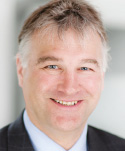 |
|
Giles Kidner (58) – Chairman and non executive director Giles was appointed to the board in 2004 and as chairman in May 2019. He is also a director of the group's property holding companies and a member of the governance committee, the investment and capital management committee and the remuneration committee. He has previously been the chairman of the audit committee. He is a consultant orthodontist at Buckinghamshire Healthcare and Oxford University Hospitals NHS Trusts and also works part time in private practice. He is lead orthodontist for the Spires regional cleft lip and palate service, Caldicott Guardian and an examiner for the intercollegiate specialty fellowship examination in Orthodontics. |
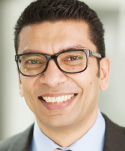 |
Farrukh Mirza (52) - Chief executive Farrukh joined the society as head of finance in 1999. He was appointed as deputy chief executive in 2003, and to the board and as chief executive in 2008. As the group’s chief investment officer, he chairs the investment and capital management committee and is also a director of the group’s property holding companies. After qualifying as a chartered accountant, he worked with BayernLB and PricewaterhouseCoopers, specialising in banking and insurance. |
|
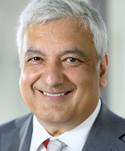 |
Raj Rattan MBE (66) - Vice chairman and independent non executive director Raj was appointed to the board in May 2019, and as vice chairman in August 2020. He is a member of the governance committee and the operational risk and reputation committee. He combined his career in general dental practice with his role as Associate Dean at the London Deanery. He has been a policy adviser at the Department of Health and provided consultancy services to the NHS and the private and corporate sector. He has worked at Dental Protection for over 20 years where he was first appointed as a dento-legal adviser and is now Dental Director. He has been an examiner for the Faculty of General Dental Practitioners and has lectured extensively throughout the UK and overseas. He has written extensively about practice management, governance and risk management within the dental profession and was appointed MBE for services to dentistry in 2008. |
|
 |
Brian Bourke (61) – Independent non executive director Brian was appointed to the board as a non executive director and as a member of the audit committee in August 2020. He retired as a specialist in orthodontics in 2021 and was an examiner for Fellowship of the Faculty of Dentistry of the Royal College of Surgeons in Ireland in orthodontics from 2011 to 2023. He has previously been a Consultant Orthodontist and Head of Department at St. Columcille’s Hospital in Dublin, Chairman of the Orthodontic Advisory Committee of the Royal College of Surgeons in Ireland, member of the Intercollegiate Specialty Advisory Committee in Orthodontics and Chairman of the Gloucestershire Orthodontic Managed Clinical Network. |
|
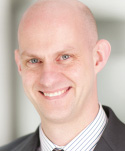 |
Simon Elliott (49) – Chief Risk Officer Simon was appointed to the board as an executive director in 2015 and has operational oversight of the compliance and marketing teams. He is also a member of the investment and capital management committee and a director of the group's property holding companies. Simon joined the society in 2007, after working for 11 years at Deloitte LLP in their actuarial practice, advising and working with friendly societies and insurance companies within the UK and Europe. |
|
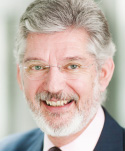 |
Martyn Green (70) - Independent non executive director Martyn was appointed to the board in 2010. He is the Chairman of the governance committee and a member of the remuneration committee. He was previously a member of the operational risk and reputation committee. He is on the Council of Reference for the dental charity Bridge2Aid, a member of the Health, Education and Social Care Chamber of the First-tier Tribunal and a chair of the General Medical Council’s Medical Practitioners Tribunal Service. He was previously a member of the Probate Committee of the Institute of Chartered Accountants in England and Wales and a member of the Statutory Panellist Assurance Committee of the General Dental Council. He was a chair of the General Dental Council’s Fitness to Practise Panel. He has worked extensively in the training of newly qualified dentists, having been in various roles, including Regional Adviser in general dental practice and Associate Postgraduate Dental Dean. He is retired from general practice. |
|
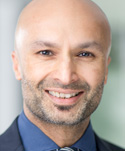 |
Jim Karim (57) – Independent non executive director Jim was appointed to the board in 2017 and as chairman of the audit committee in May 2019. Jim is a chartered accountant with over 20 years’ experience in the banking industry, working in various senior risk management roles. He is currently a Head of Risk for Liquidity and Banking Market Risk at a major UK bank, with responsibility for risk monitoring and control of the bank’s UK liquidity, asset and liability management, ALCO investments and pensions risks. |
|
 |
Kirby Mardle (39) - Chief Finance Officer and Group Secretary Kirby was appointed to the board in 2019 and has operational oversight of the finance and member services teams. She joined the society in 2006 as a member services consultant. She later moved into the finance team and following her qualification as a Chartered Certified Accountant, was appointed as head of finance in 2012. She is also the head of human resources. |
|
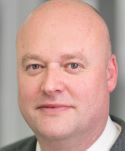 |
Matt Payne (51) - Chief Technology Officer Matt was appointed to the board in November 2021 and has operational oversight of the information systems team. He joined the society in early 2021. |
|
|
|
Melanie Stern (60) – Independent non executive director Melanie was appointed to the board in 2019. She was a consultant and honorary senior clinical lecturer in orthodontics at the Charles Clifford Dental Hospital and a Clinical Lead for 12 years. Melanie is lead cleft orthodontist for the Trent Regional Cleft Network and has previously worked part time in private practice. |
|
|
|
Alister Weightman (59) - Independent non executive director Alister was appointed to the board in 2011. He is the chairman of the operational risk and reputation committee and a member of the audit committee. He has worked in general dental practice since 1987 and was previously a dental practice adviser for the Yorkshire and Humber Area Team of NHS England, a clinical support manager for IDH Mydentist in the North East region, a past treasurer of the North Lincolnshire Local Dental Committee and dental practice adviser for Doncaster and North Lincolnshire Primary Care Trusts. He has also been a clinical assistant in orthodontics and a vocational trainer. |
|
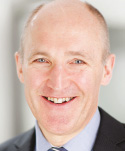 |
Huw Winstone (65) - Independent non executive director Huw was appointed to the board in 2014. He was appointed to the operational risk and reputation committee and as Chairman of the remuneration committee in February 2016. Huw started in general dental practice in 1981 as an associate and was a partner of a family dental practice in North West Kent for over thirty years. Since 1996 he has been a dental adviser for the NHS and is currently senior dental clinical adviser for NHS England South East. Huw has worked for over twenty five years in Dental Foundation Training, as a Vocational Training Adviser, Training Programme Director and an Associate Dean for Health Education England. He has also been a member of the Kent Local Dental Committee since 1988, being treasurer for over twenty five years. |
Audit committee
The role of the audit committee is to assist the board on matters of financial reporting, risk management and internal control. Terms of reference
Investment and capital management committee
The role of the investment and capital management committee is to assist the board in discharging its duty to effectively identify, assess and manage investment and capital management related risks. Terms of reference
Governance committee
The role of the governance committee is to assist the board in discharging its duty in the area of corporate governance, nominations and enterprise risk management. Terms of reference
Operational risk and reputation committee
The role of the operational risk and reputation committee is to assist the board in discharging its duty in the area of operational, conduct and reputational risk management. Terms of reference
Remuneration committee
The role of the remuneration committee is to assist the board in discharging its duty in relation to the group’s remuneration related matters. Terms of reference
View the full copy of our latest annual report here
Or click on the links below to see specific sections of the report:
Strategic report
Governance
Financial statements
Other information
The UK Prudential Regulatory Regime for insurance firms require us to publish an annual Solvency and Financial Condition report at the end of each financial year. This report gives a detailed summary of our performance, how we manage our business, the risks we are exposed to, how we manage these risks as well as information on our capital position.
Engagement with the companies we invest in
The Revised Shareholders Rights Directive (SRD II) applies, amongst others, to insurers and imposes certain disclosure requirements on their engagement as investors in EU companies listed on a regulated market to encourage long-term stewardship.
The purpose is for large asset managers to have a policy to integrate shareholder engagement into the investment strategy for the funds they have under management. Such a policy should cover the long-term investment strategy of the asset manager, how it interacts with the other shareholders of the EU companies that it invests in, and how its casts its votes in the general meetings of such investee companies, among others.
Dentists’ Provident is a small mutual insurer with relatively modest assets under management, mostly in collective investment schemes. The shareholdings that these funds have in listed companies are well diversified and our share of each individual shareholding is insignificant in relation to the shares in issue of the companies that that the funds invest in.
Our investment mandate also permits us to make direct investments in securities. Again, our ability to engage with companies is limited due to the small size our holding.
For these reasons, Dentists’ Provident is of the opinion that it does not require an engagement policy under the Revised Shareholders Rights Directive.

Our 2024 Annual General Meeting will be held at 91-94 Saffron Hill, London, EC1N 8QP on Friday 24th Ma…
Read more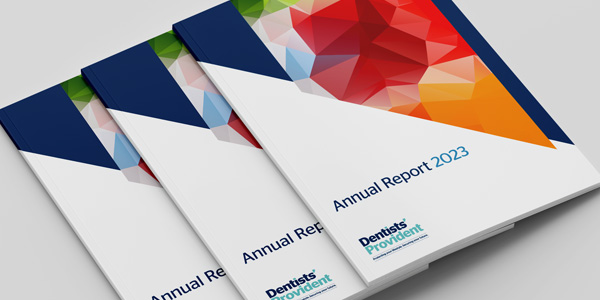
The 2023 annual report from Dentists’ Provident, a leading income protection provider for dental profe…
Read more
Our next exhibition is the Dentistry Show London in October, where we look forward to meeting anyone interested in becoming a member or members wanting to discuss their plans.